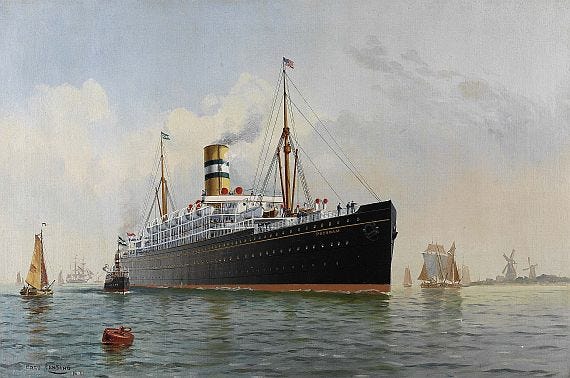Crazy Poor Dutch People

Here's the latest from the Holland Sentinel's "community columnist":
I wanted to call my new book “Crazy Poor Dutch People Who Immigrated to the U.S. and Became Rich, Republican and (Ironically) Anti-immigration,” but my publisher thought that title was too long and unnecessarily provocative. Plus, the allusion to “Crazy Rich Asians” is already dated.
Instead, I went with “The Truth About Who We Are,” which is not nearly as clever. It is available from the publisher and will soon be available through Amazon.
When I retired less than a year ago, I took up the country’s second most popular hobby which is genealogy. (The first is gardening, if you don’t count watching TV.) I spent long hours constructing my family tree. I had no idea before I started that so many resources were available online, everything from baptism and death records to ship manifests and grave locations.
I explored cemeteries all over West Michigan and interviewed everyone—mostly my 91–year–old mother—who could help me identify relatives in old photographs. I traced my ancestry back to the 1700s and stopped there, though without much effort I could have gone further.
The name Brouwer, I discovered, first appeared in my family tree around 1811 when Napoleon Bonaparte, whose army was occupying northern Europe at the time, decided that everyone in the Netherlands had to adopt a last name. He also decreed that there should be registries for births, marriages and deaths. Say what you want about the “little Corsican,” as the Dutch and others called him, he should be the patron saint of genealogists everywhere.
I also discovered that my ancestors were desperately poor. I should have guessed as much, but I had no idea how poor or how desperate. Historian James D. Bratt, in his fine history of Dutch Calvinists in America, calls this mid to late 19th century migration “a mass exodus of the rural poor.” The Netherlands did not send its best. And neither did Ireland, Germany, Italy, Poland and the other countries who sent millions of immigrants to the U.S.
But poverty was not their only motivation. I am also descended from a separatist religious movement, people who hated the state church in the Netherlands and longed to be free to worship as they saw fit.
I was unable to find any record that the state church was sorry to see my ancestors leave. In fact, the state church must have felt relief with each departing ship. Sad to say, though, the separatist spirit which began in the Netherlands continued in the new world, with personal as well as ecclesiastical implications. The people from whom I am descended battled over doctrinal matters that most of us would find inconsequential today.
My father grew up in a household where his mother was Christian Reformed, his father Reformed Church in America, and his grandfather (who came to live with them after he had been widowed) Protestant Reformed. My father never said much about this Reformed family in–fighting, but he began to paint at an early age and seemed to find solace in painting throughout his life.
What I came to realize as I did my research is that these are the factors that formed and shaped the person I am today. More than my DNA, which I sent off to be tested as part of my research, these traits—some good and inspiring, others troubling—shape me in some profound ways.
My grandparents and great-grandparents came to the U.S. and sacrificed a great deal. Most of them left school after the eighth grade to work at jobs I would never consider taking. Most of them worked long hours and responded heroically to personal setbacks, such as the loss of children to diseases which would be relatively easy to treat today. Most of them wanted the best for me and created a world in which I could thrive and, as my mother (still) likes to say, “make something of yourself.”
The work ethic of Dutch immigrants was breath-taking. Within a year after Albertus Van Raalte established the colony that was to become Holland, the Detroit Free Press reported that “there were about 200 houses of all descriptions, from the rude hut covered with bark, to the well finished and painted frame house … in front of the house a gate, and at every window on the street the neat white curtain.”
For most of my life I have admired my ancestors, but in equal amounts I have been troubled by them. I have inherited enough of the separatist spirit, for example, to believe I am right about most doctrinal matters. And like my ancestors I often prefer being right to getting along.
But along with this stubbornness, there is also a compelling humility, a realization that all I have and all I am is the result of something beyond myself. One of my ancestors, an important figure in Holland history, wrote a brief autobiography toward the end of his life and concluded with these words: “The Lord has greatly favored me, an unworthy sinful man. I cannot account for His goodness … but humbly bow before Him believing that He is an all–wise God.”
I suppose I could say the same about myself.
(Photo: My grandmother, Minnie Glerum, was five years old when she arrived along with her family, on the SS Potsdam—shown above—at Ellis Island in New York Harbor, on September 3, 1907.)



